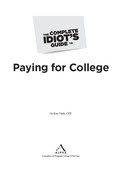Vocational Schools
Although most people wouldn’t lump in vocational schools with other forms of nontraditional education, I do. In part, that’s because attendance of vocational schools dropped off during the 1980s and 1990s, with most of those students feeling the pressure to earn a college degree. However, as North America has become full of people with college degrees, fewer and fewer people are skilled in the trades necessary to keep basic industries running successfully.

DEFINITION
A vocational school is one that trains someone specifically to perform a certain job within a certain industry, such as welding or dental assisting. These schools do not typically require students to take general education classes such as English, math, or a foreign language. Because of this, they typically offer certificates to their graduates instead of degrees.
From welding to electronics repair, the job market is booming for people trained in certain hands-on professions. Entry-level people in these fields are earning more than ever, frequently exceeding what college graduates of the same age are earning. Further, many go on to own their own businesses in those fields, earning incomes well in excess of $100,000 annually.
Best of all, when it comes to paying for an education and the time that is required to earn it, many vocational programs last a year or less, do not cost nearly as much as a college degree, and are offered through nontraditional means that allow students to continue their current lives and control their costs.
Best-Paying Vocational Careers
Although plenty of careers can earn you good money with little or no formal training, they often take the right kind of personality and some luck to succeed. For example, it’s not hard to get licensed as a real estate agent in many states and the potential income is unlimited. But, the number of people truly succeeding and making solid careers as Realtors is far less than the number of people who try and fail.
By contrast, many higher paid vocational careers don’t take a major drive to conquer the world, extraordinary sales skills, or a huge dose of luck. They simply take mastering the required skills and acquiring the right certifications. Aside from that, all personality types are welcome and most will be destined to make a good living.
Here’s a list of the top careers that take some formal vocational training, usually at a vocational college, that also pay handsomely ($50,000 to $100,000 per year) after someone graduates.
• Building inspector
• Court reporter
• Dental hygienist
• Electrician
• Emergency medical technician
• Interpreter
• Massage therapist
• Plumber
• Truck driver
• Welder
Selecting the Right Vocational School
As a kid growing up in Southern California, I distinctly remember commercial after commercial promising people big bucks for going back to school at places like Barbizon, Dootson Driving School, DeVry, and ITT Technical Institute. I remember, even as a kid, thinking that some of these operations looked kind of shady, especially the one that offered a home study course in gun repair!
Over time, it became clear that some of these organizations were very legitimate, with others being nothing more than diploma mills that siphoned off people’s cash. Although the names might have changed somewhat, the challenge still remains: finding a legitimate vocational school that will really teach the skills needed to succeed in specific fields.

CHEAT SHEET
Many vocations require someone to be an apprentice or work under someone else for a certain amount of time prior to opening her own business. In selecting a vocational school, it’s a huge plus to find one that helps students land apprenticeships or has a built-in career center to help you find employment after you graduate.
After you decide on a vocation that’s right for you (as opposed to the one that just pays the most), it’s essential that you do your homework on vocational schools. There are three primary ways to go about doing this, all of which are pretty darn easy.
First, you should call some local employers in your planned vocation and simply ask them which schools they’d recommend and hire from. If you explain why you are doing this, most people will be very happy to help. The call goes something like this:
“Hi, my name is _______. I was thinking about going back to school to work in your field, and I was wondering if somebody there had five minutes to give me recommendations on schools to attend and avoid.”
That’s it. If you make 10 phone calls, you’ll probably get 3 to 5 honest answers, which are more than enough to begin making an informed decision.
Second, as I’ve recommended so many times with so many different things, spend some time on the Internet searching for each school’s name followed by the words “scam,” “rip-off,” or “complaints.” Be sure to check with your local Better Business Bureau (BBB) as well. Just remember that even the best schools get some complaints, so focus on looking for common trends among the complaints. If people are consistently saying that “it was a waste of money” or “I couldn’t get hired,” then you should look elsewhere.
Lastly, find out if the school is accredited by one of the regional accrediting bodies for schools or is endorsed by your desired vocation’s professional organizations. If it’s not either accredited or endorsed, you should skip that school unless local employers strongly recommend the program.
..................Content has been hidden....................
You can't read the all page of ebook, please click here login for view all page.
